Understand how to reduce risk to make sure your gear gets on site

On site safety is a priority of any project and to ensure the safety of your entire on site team, risk must be reduced in all aspects of the project. As a plant and equipment supplier, it's your responsibility to ensure your gear complies with safety standards to be approved for on site work. The site manager or plant manger of the project is responsible and liable for all on site risks and incidents, therefore they will not work with you if your gear does not guarantee safe and problem free operating.
Hazards
Some of the potential hazards associated with plant and equipment are:
- Contact or entanglement with machinery or material in motion
- Being trapped between the machine and any material or fixed structure
- Being struck by parts of the machine or by materials on the machine
Once you understand the possible risks associated with plant and equipment on site it's important you conduct a risk assessment to ensure precautions have been taken to avoid these hazards. The most effective method to control risk is to eliminate the potential for risk associated with plant and equipment. If the on site plant manager or site manager find that your gear does not meet safety specifications or standards they will not approve it for on site use.
Operator's responsibility
As the plant owner or operator you have a responsibility to provide certain information if you want your gear to be approved for on site use.
All plant operators must:
- Complete appropriate training and assessment as required
- Only operate plant for which current certifications are held
- Report any suspension or cancellation of driver's licenses
- Comply with all approved safety information provided with the plant
- Record plant pre-operational inspections and incidents in a logbook
- Ensure that regular inspection, servicing and maintenance is carried out to manufacturer's requirements
- Follow safe operating practices and follow instructions given by on site supervisor
It's important that owners and operators are aware of these requirements and are doing all necessary checks. Site managers or plant managers will simply turn away your gear if you arrive at their site gates and they believe that your plant or operator is not compliant. The transport of plant is expensive and timely therefore taking a risk when you know you have overlooked an aspect is not worth it. Not only does it waste your time and money, it can effect your reputation with that manger and any other sites they may be in contact with.
Safety tips to consider
If you arrive at the site gates and the plant manager or site manager inspects your plant and confirms that your gear complies with standards and approves your plant for use, it's equally vital to make sure that your gear remains compliant throughout the duration of your job.
Tips for maintaining safety standards:
- Never adjust, repair or oil plant while in use or in motion
- Always use the lock out switches to avoid incidental starts
- Always replace guards after repairs have been completed
- Regularly check for cracks, stretching, damaged cables, chains, clamps, hooks and any plant that is regularly placed under stress
- Report all plant that is damaged or creating a potential hazard immediately
Don't run the risk of getting your plant turned away at the site gates, site managers and plant managers will not be lenient because at the end of the day, the liability of incidents, injuries and so on falls on them. If you don't comply you won't be allowed on site. Meeting safety standards and the quality of your gear is important in every hire transaction and the more work you begin to win the better your understanding will become of what's expected of your gear. In order to help increase the amount of work you win and improve your knowledge of plant and equipment compliance we've put together an infograph with 4 tips to increase your chances of winning hire work.

Related Articles

6 questions all mobile plant operators should know how to answer
Operating mobile plant comes with high levels of risk and as the supplier or operator, it's your responsibility to be aware of these risks and how to eliminate or minimise them. So while you may think you're on top of all requirements for the onsite operation of your plant, it's a beneficial habit to regularly check in with regulations and implement any changes. To help you cover your bases, we've listed a few common questions that often come up between owners and operators.

Quick tips to enforce fall protection regulations on-site
Without a doubt, working in construction has increased hazards compared to other industries, making safety regulations an ever-topical discussion point among construction companies. This has never been more true than with employees working at heights. When working feet above ground, workers should comply with the fall protection regulations set by site managers as these rules will keep everyone safe from accidents and from falling off a high structure.

4 tips to prepare your fleet for hire
Equipment hire and plant hire are important processes in any construction project, whether people are hiring a crane, bobcat, scissor lift, even a portable toilet, they must be aware of the health and safety requirements, method of operation and what gear to use when. Four steps can help you get your gear ready for hire and make your equipment hire business attractive to those looking for your services.
Get the latest project news
- updates on Australia's pipeline of state and federal projects
- fresh contract awards from major contractors and builders
If you're looking to contact us about other matters, please contact us.


